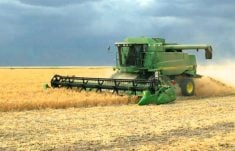By Brian Cross
Saskatoon newsroom
Ottawa has unveiled new legislation aimed at improving rail service to western Canadian grain shippers.
The Fair Rail for Grain Farmers Act, tabled in Parliament today by federal agriculture minister Gerry Ritz, will expand railway interswitching provisions and will require railways to provide more information on the amount of grain they move.
The amendments will extend the interswitching distance to 160 kilometres from 30 km in the prairie provinces for all commodities.
The new railway reporting requirements will allow Ottawa and the grain industry to better monitor overall railway performance, although railways will not be required to report grain movements on a corridor by corridor basis.
Read Also

Association of Equipment Manufacturers sets up lobby in Ottawa
The Association of Equipment Manufacturers, an organization representing North America’s agriculture and construction equipment makers, is setting up an office in Ottawa.
If necessary, Ottawa will also have the ability to dictate how much grain is moved by the country’s major railway companies.
“Going forward, railways will be required to deliver more timely data on grain movements to better monitor the overall performance of the supply chain,” said a government new release issued earlier today.
“The Canadian Transportation Agency will also gather information from all grain supply chain partners on shipping capacities and plans prior to each new crop year, and will advise the Minister of Transport whether specific grain volumes should be mandated for the coming year.”
Ottawa will also accelerate its review of the Canada Transportation Act with a view to further improving Canada’s grain handling system over the long term in order to achieve improved capacity, predictability, planning and accountability for all parties in the supply chain.
The CTA review was originally scheduled to take place in 2015.
The new legislation does not make changes to railway revenue cap that currently limits the amount of revenue that railways can generate from moving a tonne of grain.
Together, measures contained in the new legislation will increase supply chain transparency, strengthen contracts between producers and shippers, and ensure the entire grain handling and transportation system is working efficiently at the top of its capacity, Ottawa said.
“This legislation creates the necessary tools to help ensure Canadian shippers have access to a world-class logistics system that gets their commodities to market in a predictable and timely way,” said Ritz.
“Farmers and our economy need a system that works today and tomorrow, with the capacity to move what is grown.”















